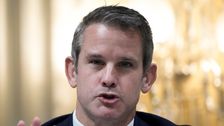Former Rep. Adam Kinzinger (R-Ill.) pointed out Florida Gov. Ron DeSantis’ “absolutely outrageous” move to not meet with President Joe Biden in the aftermath of Hurricane Idalia.
Kinzinger, in a CNN appearance on Friday, criticized the Florida governor after he expressed logistical concerns over Biden’s trip to survey hurricane damage, remarking that the visit could be “very disruptive.”
″There’s a one to two percent chance it’s logistics, there’s a 98 to 99 percent chance it’s the optics,” Kinzinger told CNN’s John Berman.
Biden, earlier in the week, indicated that he and DeSantis were communicating to a level that there should be a “direct dial” between the two, the Associated Press reported.
But after Biden said that he was set to meet DeSantis, the Florida governor’s office on Friday pointed to “security preparations alone” that would contribute to shutting down recovery efforts.
The GOP presidential candidate not meeting with Biden marks a change from past post-disaster visits as the president and DeSantis met following Hurricane Ian last year and the 2021 collapse of the Surfside Condo in Miami Beach.
Kinzinger told Berman that politics has “infected everything” at the moment whereas a decade ago he saw officials putting “politics aside.”
“And Ron DeSantis, at the cost of the benefit to Florida, has decided his political campaign cannot have him meet with Joe Biden, the President of the United States, who ultimately will be signing the checks that Florida is going to be begging for,” Kinzinger added.
″…I couldn’t imagine being governor of any state, having a tragedy like that and then turning around and thinking about how this could affect my election. It just – it’s where we’re at now, and people have to just reject that.”
Biden, when asked what message he had for DeSantis on Saturday, declared “we’re going to take care of Florida.”
The president heard from a number of Florida officials who praised him and first lady Jill Biden for offering support to the Sunshine State including Sen. Rick Scott (R-Fla.), who referred to the federal government’s efforts as a “big deal” for the state.


